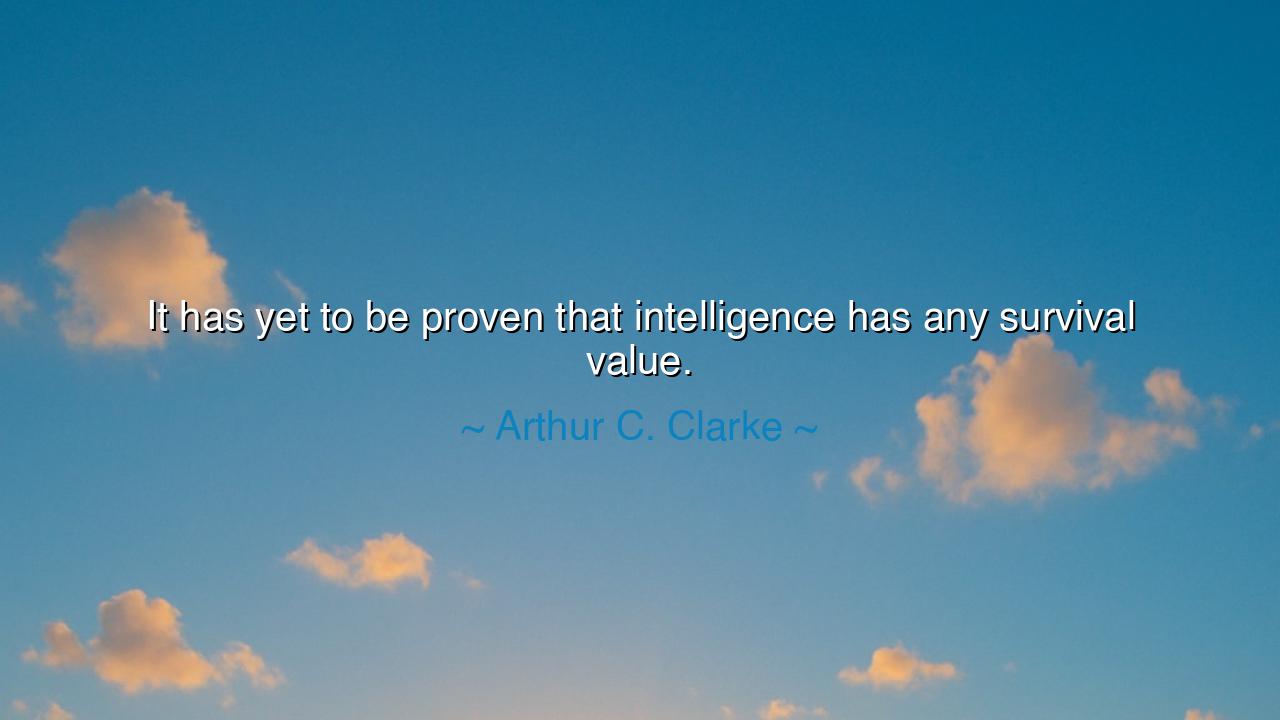
It has yet to be proven that intelligence has any survival value.






In the long twilight of the modern age, when machines began to outthink their makers and humanity stood uncertain before its own reflection, the visionary Arthur C. Clarke spoke with both irony and foresight: “It has yet to be proven that intelligence has any survival value.” To the casual ear, this sounds like a jest — the dry humor of a scientist-philosopher gazing at the folly of humankind. Yet to those who listen deeply, it is a lament, a warning, and a mirror held before civilization itself. Clarke, whose imagination reached beyond the stars, saw with painful clarity that knowledge alone is not wisdom, and that the cleverness of humankind may yet become the instrument of its own undoing.
The origin of this quote lies in Clarke’s lifelong contemplation of progress and peril. A prophet of science and a poet of reason, he lived in the century that split the atom, walked upon the moon, and built machines that could think. Yet amid these triumphs, Clarke saw the paradox of human intelligence: that it multiplies power faster than it cultivates compassion. The same mind that mapped the heavens also made weapons capable of ending the world. Thus, his words carry the gravity of experience — the recognition that intelligence, ungoverned by wisdom, does not guarantee survival but often endangers it. It is not thought itself that saves, but the spirit that guides it.
History, too, bears witness to this truth. Consider the rise and fall of ancient Athens, the birthplace of philosophy and democracy. Its people were among the most intelligent of their age — architects of art, logic, and governance. Yet their brilliance turned inward, toward vanity and faction. They quarreled, schemed, and waged war upon themselves. Their intellect sharpened, but their unity rotted. In the end, Athens fell not to barbarism but to its own brilliance untempered by humility. Clarke’s words echo this eternal lesson: that the mind can soar to the heavens, but without the heart, it will plummet back to ruin.
Even in the story of our own age, this warning resounds. The 20th century, radiant with discovery, was also darkened by devastation. The splitting of the atom promised endless energy — and delivered Hiroshima. The digital revolution promised connection — and brought isolation. Intelligence has given humankind mastery over nature, yet not over itself. Clarke, who dreamed of interstellar civilizations, feared that our species might not live long enough to see them. His irony is bitter but true: for all our intellect, we have yet to prove that we deserve the title of “wise.”
And yet, his words are not a condemnation, but a challenge. For Clarke did not despise intelligence; he revered it. He believed that thought, when joined with empathy, could lift humanity toward the divine. His jest about survival is a call to balance — to remind us that the survival of the species depends not on how much we know, but on how well we understand. Knowledge is a blade; wisdom is the hand that wields it. Intelligence, if it is to endure, must learn the humility to serve something greater than itself: compassion, justice, and love.
In this, Clarke stands among the ancients, echoing the voice of Socrates, who once said that the unexamined life is not worth living. To be intelligent without wisdom is to live unexamined — to see clearly, but without purpose. The wise do not seek to outwit the world, but to live in harmony with it. The fool builds machines to conquer nature; the sage builds understanding to coexist with it. Thus, Clarke’s humor conceals a sacred truth: that the true measure of intelligence is not survival of the fittest, but survival of the kindest.
Consider the story of Albert Schweitzer, physician and philosopher, who turned from music and theology to serve as a doctor in the jungles of Africa. He saw that brilliance without compassion was meaningless — that the world did not need more clever men, but more humane ones. His life embodied the principle that Clarke implied: that intelligence must serve life, not merely sustain it. Survival, in the highest sense, is not merely the persistence of the species, but the elevation of the soul.
Therefore, O listener, let Clarke’s jest become your meditation. Do not take pride merely in knowledge, nor delight solely in cleverness. Seek wisdom, not just intelligence. Let your mind be sharp, but your heart soft; your curiosity vast, but your humility vaster. For in the final measure, it is not the clever who will endure, but the compassionate — not the ones who outthink destruction, but the ones who outlove it.
And when you gaze upon the stars, as Clarke did, remember this: that the light of intelligence alone cannot save us, but the light of understanding may yet guide us home. For the universe is vast, and indifferent — but the spark of wisdom, small though it may be, is the one fire capable of outlasting time itself.






AAdministratorAdministrator
Welcome, honored guests. Please leave a comment, we will respond soon